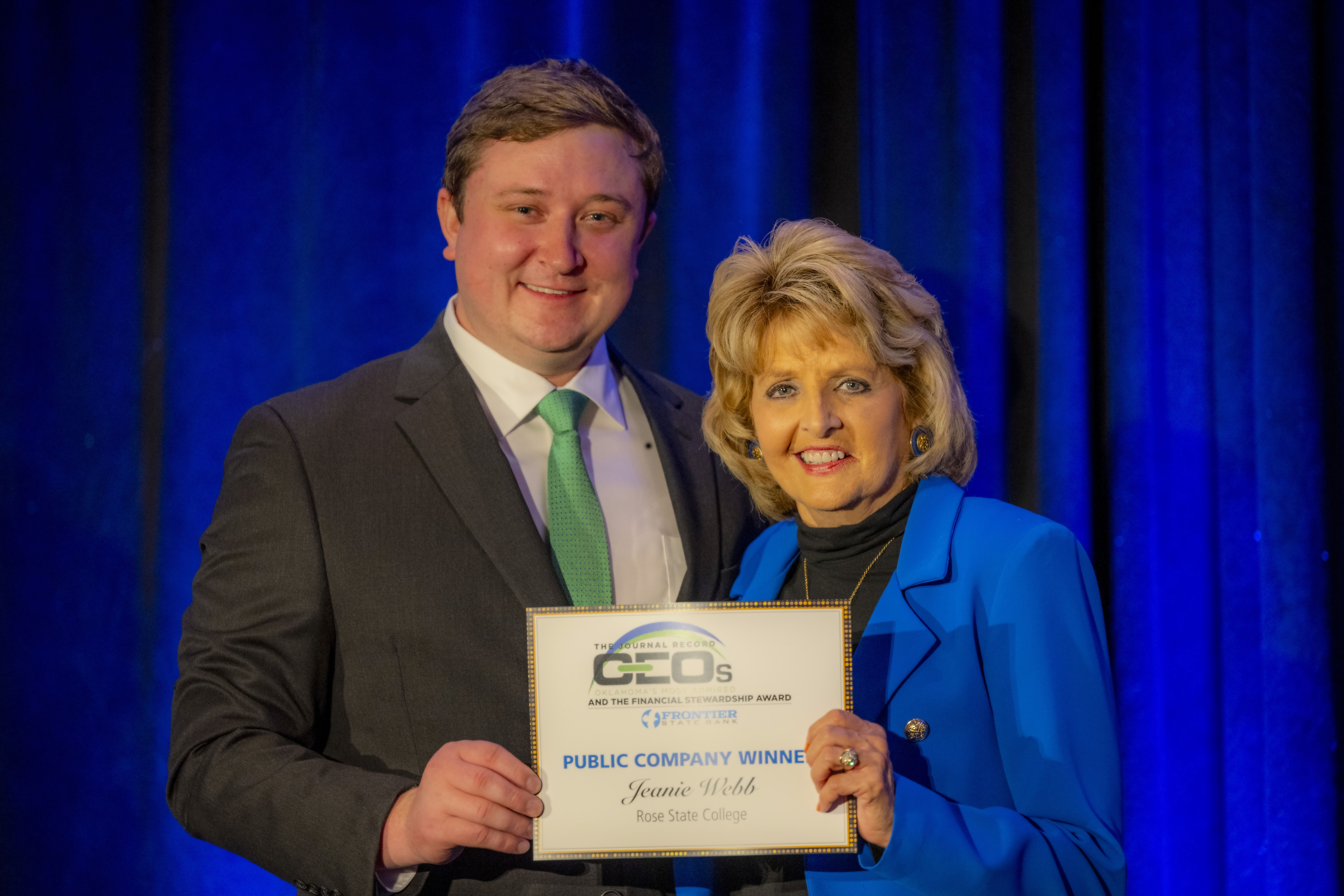Conrad, Juanita
Juanita Conrad
Born: 1912
Date Interviewed: February 21, 2003
Interviewer: Cheryl Spano
Topic: Work experience during WWII
Q: When and where were you born?
A: Altus, Oklahoma, 12th of February, 1912.
Q: Where did you attend school and for how long?
A: My father worked for the railroad and I graduated high school in Chickasha. He moved around and I went to a number of different schools.
Q: Did you go to college?
A: Oklahoma College for Women (OCW). It’s a college of arts and science now, but it was the only girl school then and he wanted something that was an all girl school.
Q: What were your interests and hobbies as a young woman?
A: I graduated with an art degree.
Q: What year did you graduate from college?
A: 1936. I married when I was 17, but I ignore that one! I was a Roman Catholic and was excommunicated from the church because I got a divorce. I said I would have cut my head off to get that divorce. So I divorced him when I was 20 and started to college. I think they were the happiest years of my life. It was an all-girl school and they were strict – strict – strict! They didn’t care whether you learned anything or not, but you learned how to carry a cup around! To leave the campus, you had to have hat, gloves, and heels.
Q: When did you start working? After you got out of college?
A: I married again. My husband was a pharmacist and we bought a drug store in Kingfisher. To save money, I worked there and I could open up and close up.
Q: Did you husband get called up for the war?
A: My husband was divorced, too. He had three children. They were drafting from 18 to 40. While he was in boot camp, he had his 40th birthday. They released everyone from the Army that was over the age of 40. I followed him to San Diego, and that’s why I worked – to make a living. They paid him $15.00 a month salary! So I had to get a job and find a place to live. There were very few places. I rented a room. . .
Q: Did you sell your business here in Oklahoma before you went to California?
A: I went out to be with him before he was shipped overseas. But instead, he was held on a 24-hour recall. They sunk a German ship in the harbor and had a complete black-out. No street lights, no lights inside. It was a complete blackout because the German planes were flying over. You go out now and how pretty it looks with the lights around. Well, there it was just pitch dark where you could barely see your hand. I was completely self-supporting and salaries were very low, but everything was frozen – rent, apartment. We got [ration] stamps for a pair of shoes once a year. But that was the end of the Depression when the war started. People couldn’t get jobs. These houses out here were wheat fields. After the war, the men came back. Many of them married while they were in the service, and there was no place for them to live. They built all these houses. You could buy them with no down payment. My house cost $3000.00, this house.
Q: Did your husband have to go overseas?
A: When he finished boot camp he was 40 years old. They would take these long 10-mile hikes and several died through the stress. It was the younger ones that died and my husband said he didn’t think he could make it, but he did make it. He couldn’t be a pharmacist in California because he got his pharmacy degree in Oklahoma and he couldn’t participate in California. Of all the men that were released, he already had his orders to go to the hospital. Pharmacy was the only profession that was where they didn’t go in as an officer. He could either work at Rohr or Douglas and he chose Douglas. There were two or three thousand people worked there in Quonset huts and there were only two of them that were discharged because of age – an honorable discharge, subject to 24-hour recall. So we couldn’t come back to Oklahoma because we couldn’t make it in 24 hours.
Q: When did the United States start bringing women into the defense industry?
A: The Rosie the Riveter – they started drafting the men and then they brought the women in. It was almost impossible for a woman to get a job, yet there wasn’t any men – they were gone. So the women came in and took the men’s jobs. I didn’t even know what a union was and Rohr was union. My union card said I was a master mechanic. They moved one machine up and you were taught. There were three things I did. I had no idea what they were – they taught me how to do that, and then they moved it on up, and I did the same on the next one and the next one and the next one. I had just graduated from college with an art degree.
Q: What year did you start working?
A: 1936. The war started in 1942.
Q: How did the people close to you react to your decision?
A: They felt that I should. OCW was a teacher’s college and most teachers were women.
Q: How did other women feel about being in the work force?
A: They built Tinker and then they built Midwest City to accommodate the people who came here. People were going from here to California to get jobs and it was just expected of you. I followed him in the service expecting to be there maybe three or four months. But when he was discharged and couldn’t go back to Oklahoma and couldn’t work in a drug store or anything that, then we lived there for 18 months during the war. Almost all of the employees were women.
Q: So most of the women didn’t understand the jobs they were doing, but they were taught as you went along?
A: Yes. Women who had not been able to get a job here in Oklahoma, they went to work at Tinker, and we stayed out there for 18 months. The draft board said they can’t do this. They either have to keep you or let you go. We came back and spent the rest of the war.
Q: Did you work at Tinker then?
A: No, I had my credentials that I could go to work at Tinker, but I went from the assembly line to actually doing riveting. One time I riveted my thumb. It will go so far and won’t go any farther whether it’s a piece a metal or what. Then they had an opening – there were only 17 people – in the modeling department, and that’s what we are doing [showing a picture]. I had made molds in college so that I didn’t have to be trained or anything. There were so few people who had any idea of what mold-making was. We made the molds that went into sold and they called it drop-hammer. They dropped a piece of metal on it and everything has to start with a mold. Whether it’s a car, refrigerator. Then it was riveted together. Without us, it couldn’t have been. We made all the parts for doing this.
Q: How many hours per day did you work and how many days per week did you work?
A: Eight hours. And in Oklahoma, I had been working at Kress’ and I worked 10 hours, 6 days a week for $10.00 a week. [during the Depression].
Q: But in California, you only worked 8 hours a day?
A: They sent my resume out and I went to work for Kress’. I sold sewing equipment – embroidery frames and things like that. For a woman to have a college degree was extremely unusual. I couldn’t have gone to college because my family could not afford it, if it hadn’t been for the Depression. I lived at home and worked and went to school during the day. So when they found out that I had a degree, and there wasn’t anybody else there that had one, and that I had made molds.
Q: Did you ever work at Tinker?
A: No, I never worked at Tinker. My husband made an ample salary for me not to work. I worked for him five days a week.
Q: How much did they pay you?
A: I went to work for $.60 an hour, which was really a very good salary. In 18 months I came up from $.60, which was top pay, to $1.10.
Q: How did the women that you worked with feel about working?
A: Very proud. They were happy to have a job to support their families while the men went to war.
Q: Did you work different shifts?
A: Yes, it was a 24 hour deal.
Q: Did you have all kinds of women that worked – white, black, Asian?
A: I don’t remember anything but white women. That was a long time ago, but foreign women, they worked them – from Mexico.
Q: Did some of the women think the work was too hard?
A: They broke it down. I was taught to do three things. One was the air conditioner cooling the motor. I connected two wires. You were taught to do what you did. I could teach mold-making. We had a fence around where we worked and nobody could get in there because if you even put a thumbprint on a mold, you ruined it. I’m still making molds now!
Q: Were the foreign women workers treated different than the other workers and the white women?
A: They had absolutely no respect for people from Oklahoma. The book “The Grapes of Wrath” had just come out and people were actually going hungry. Do you know where Mulligan Flats is? When you go down Portland past Reno, that area is Mulligan Flats. People were squatters there. They would make houses out of cardboard boxes and beg on the street. People were actually going hungry. The wives were paid $50.00 a month. If they became pregnant, they sent you to the hospital – prior to that women had babies at home with a midwife or someone like that.
I went to work at Kress’ and I made $18.00 a week there in California. I was in embroidery thread and things like that. About the only job that a black women could get was housework [maid]. My mother paid $3.00 a week to a housekeeper. She ate at the table with us. We had a little house in the back that her family lived in.
Q: When you worked at Rohr, were there men who worked with the women?
A: There were older men and women. Much more women than men and the men actually taught the women.
Q: Were they the bosses or were they fellow workers?
A: I wouldn’t call them supervisors because they knew what we were doing. They were too old to be drafted.
Q: How did they feel about the women working there? Did they treat you good?
A: Since we were so badly needed, they were very, very nice to women. You didn’t hear about touching a woman inappropriately or anything like that. They were extremely nice to the women, realizing that they were so desperately needed.
Q: After the war, did they want women to quit working then when the men came home?
A: Well, the women found out what it was like to work out away from home. They needed carpenters. There hadn’t been any houses built in a number of years. People couldn’t buy houses. All the men came back – many of them were married and had children while they were in the service – so they built these houses. All this was wheat fields here. From about Reno on to 44th, which was the last paid street.
Q: So the women kept on working after the war?
A: Yes. There were more jobs. They needed more people to work. People had the money to buy or build a house. Even professional men were having trouble finding work, but after the war and when they came back and had a salary, they were needing everything. In Midwest City there was nothing there. They built Midwest City to accommodate the people who were working at Tinker.
Q: But when they came back from the war, they didn’t make women give up their jobs so the men could have them?
A: No, there was just more jobs.
Q: What kind of impact do you think women working during the war had on women today?
A: I never worked anyplace that I wasn’t treated extremely well. I don’t think women were treated badly. Men were taught to be polite to women like your sister or your mother.
Q: So after the war you just kept on working and worked all your life?
A: Well, I would call it working, even though I worked for my husband. We sold the drug store and he died, but I continued working. I worked for Veezey’s [Drug Store] for a number of years. They had a chain of drug stores all over town with soda fountains where you could get an ice cream cone or a cold drink. They had what they called “Coke dates.” You would go and sit in a booth and have a Coke. A Coke was a nickel and an ice cream cone was a nickel. A hamburger was a dime.
Q: When you were working during the war, do you think that anything you learned helped you later in life. Did you learn any skills that helped you in other jobs?
A: The only thing was mold-making. I taught others how to make molds because we were making all the molds that went into the different departments. My husband had a degree in chemistry. They mixed even the paint, so he was over the chemical department. But he got not more pay. There was a set salary. He made $.60 an hour and I made $.60 an hour. That was a pretty good salary. We could rent a nice apartment. I bought a paper when I got on the bus to go home and I would read the paper going home.



